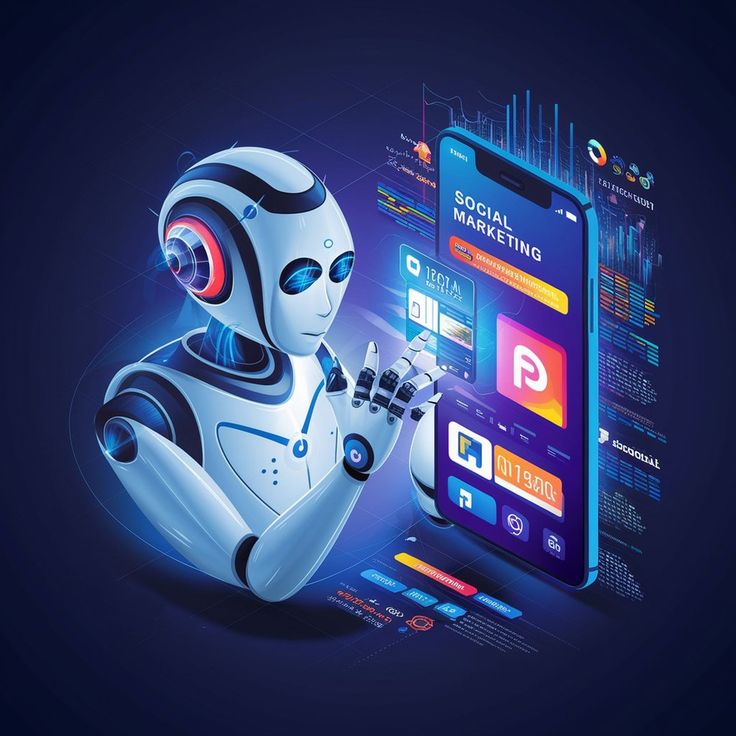🧠 AI in Digital Marketing – The Ultimate Guide

📌 Introduction
Artificial Intelligence (AI) is transforming the landscape of digital marketing. From automating customer interactions to predicting consumer behavior and personalizing content, AI empowers marketers to be more data-driven and efficient.
🧩 What is AI in Digital Marketing?
AI in digital marketing refers to the use of machine learning, natural language processing (NLP), and other data-driven technologies to enhance marketing strategies, optimize campaigns, and improve customer experience.
🔍 Why AI Matters in Marketing
- Automation: Saves time by automating repetitive tasks.
- Personalization: Delivers customized experiences.
- Predictive Analytics: Forecasts trends and behaviors.
- Efficiency: Enhances ROI by optimizing campaigns.
- Customer Insight: Deepens understanding of your audience.
🧰 Key Applications of AI in Digital Marketing
1. Content Creation
- AI tools like ChatGPT, Jasper, and Copy.ai generate blog posts, social media captions, and emails.
- Use cases: Product descriptions, email newsletters, ad copy.
2. Chatbots & Virtual Assistants
- Automate customer support (e.g., Drift, Intercom, ManyChat).
- 24/7 service and lead qualification.
3. Predictive Analytics
- Tools like HubSpot, Salesforce Einstein, and Marketo predict customer behavior and buying patterns.
4. Email Marketing Optimization
- AI segments audiences, writes subject lines, and optimizes send times (e.g., Seventh Sense, Phrasee).
5. Ad Targeting & Programmatic Advertising
- AI platforms like Google Ads Smart Bidding and Meta Ads use real-time data for optimized bidding and targeting.
6. Search Engine Optimization (SEO)
- AI tools analyze SERP trends and content gaps (e.g., Surfer SEO, Clearscope, MarketMuse).
7. Visual Recognition
- AI interprets visual data for personalized product recommendations (used by platforms like Pinterest and Amazon).
📈 Benefits of AI in Marketing
| Benefit | Description |
|---|---|
| Increased ROI | Smart targeting and automation reduce costs and improve performance. |
| Enhanced Customer Experience | AI delivers more relevant, personalized interactions. |
| Real-time Decision Making | AI processes data quickly for agile campaign adjustments. |
| Scalability | AI enables businesses to scale marketing efforts with fewer human resources. |
⚠️ Challenges to Consider
- Data Privacy & Ethics: Compliance with laws like GDPR, CCPA.
- Implementation Cost: Initial investment in AI tools and training.
- Human Oversight: AI lacks emotional intelligence and brand nuance.
- Bias in Data: Biased input data can lead to flawed predictions.
🚀 Future Trends in AI Marketing
- Hyper-personalization: Advanced customer journey mapping.
- Voice & Visual Search: Optimization for image and voice queries.
- Generative AI: Smarter content and campaign creation.
- AI-Powered Influencer Marketing: Identifying authentic influencers.
- Emotion AI: Understanding customer sentiment and reactions.
🛠 Top AI Tools for Digital Marketers (2025 Edition)
| Function | Tools |
|---|---|
| Content Creation | ChatGPT, Jasper, Copy.ai |
| Analytics | Pecan AI, Tableau, Looker |
| Mailchimp, Seventh Sense, ActiveCampaign | |
| SEO | Surfer SEO, SEMrush, Clearscope |
| Ads | Smartly.io, Adzooma, Albert.ai |
| Chatbots | Drift, Tidio, Intercom |
✅ Getting Started with AI in Marketing
- Audit Your Current Strategy – Identify areas that can benefit from automation or better data use.
- Define Your Goals – Clarify what you want AI to improve (conversion rate, cost per lead, etc.).
- Choose the Right Tools – Match tools to your goals and technical capabilities.
- Test & Iterate – Start small and scale what works.
- Stay Informed – AI evolves quickly; continuous learning is essential.
🧠 Final Thoughts
AI is not here to replace marketers, but to enhance their capabilities. When used thoughtfully, it can drive efficiency, accuracy, and creativity in your digital marketing campaigns.